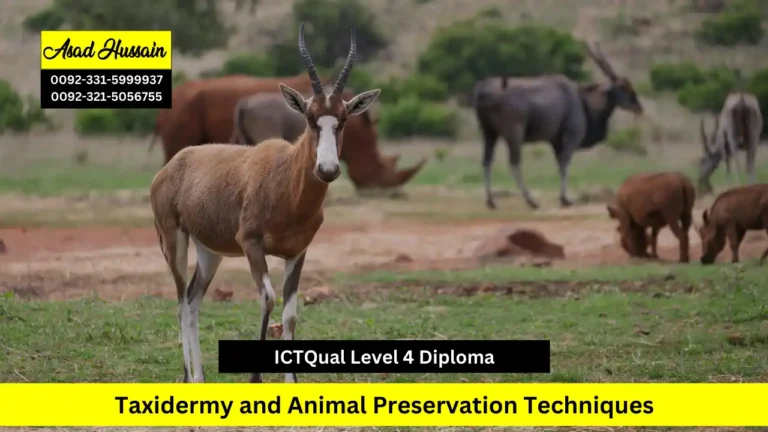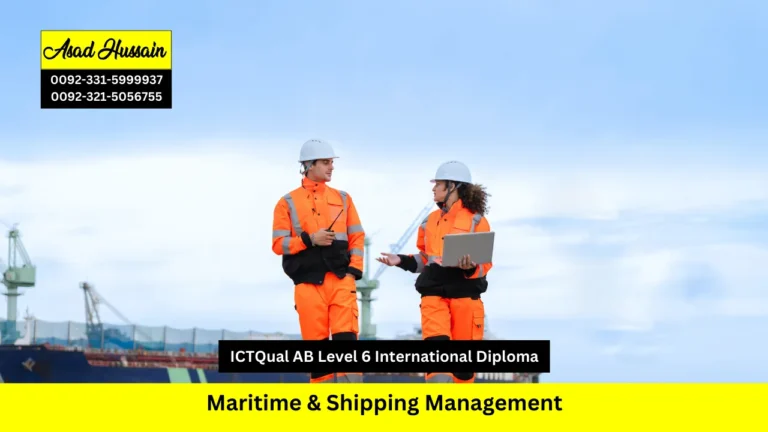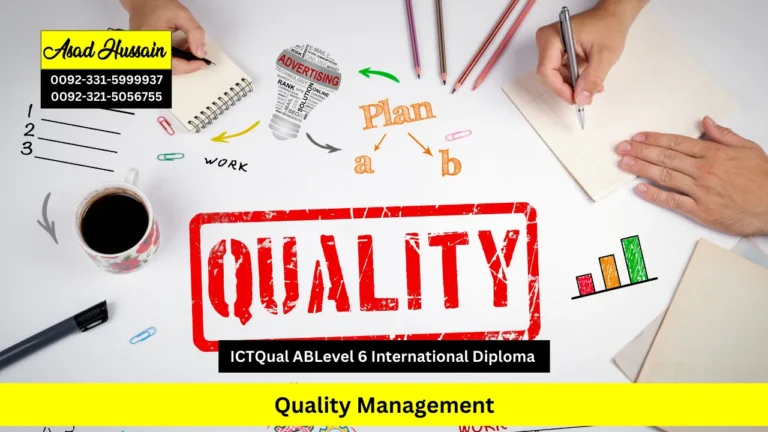The ICTQual International Level 5 Diploma in Airport, Airline and Aviation Management is a globally recognized qualification designed for individuals who want to build a successful career in the aviation industry. This program provides learners with the knowledge and skills needed to manage complex airport operations, airline services, and aviation logistics in today’s fast-paced and competitive environment. By combining academic learning with practical insights, it prepares students to take on leadership roles across different areas of aviation.
The diploma covers a wide range of topics that are essential for aviation professionals. Learners gain a strong understanding of aviation safety, air transport economics, customer service management, airport planning, and international regulations. The curriculum is carefully structured to reflect the real-world challenges faced by the industry, ensuring that graduates are equipped with both theoretical knowledge and practical problem-solving abilities. This makes the qualification highly relevant and valuable for those aiming to stand out in the global job market.
This program is ideal for recent graduates, working professionals, and career changers who are eager to enter or advance in the aviation sector. It emphasizes leadership, strategic thinking, and operational excellence, enabling learners to pursue diverse roles such as airport manager, airline supervisor, aviation analyst, or operations coordinator. The flexibility of the diploma also makes it accessible to individuals from different educational and professional backgrounds, offering a clear pathway into one of the world’s most dynamic industries.
With international accreditation from VICTQual, the Level 5 Diploma enhances employability and career mobility across borders. Graduates are well-positioned to secure opportunities with leading airlines, airport authorities, aviation consultancies, and government agencies. For anyone seeking to launch or accelerate a career in aviation, this diploma serves as a powerful credential and a gateway to long-term professional success.
Program Highlights
Mandatory Units
This qualification, the ICTQual International Level 5 Diploma in Airport, Airline and Aviation Management, consists of 6 mandatory units.
- Advanced Airline Operations and Network Strategy
- Airport Commercial Management and Infrastructure Development
- Aviation Safety and Quality Assurance Systems
- Human Resource Leadership in Aviation Organisations
- Aviation Financial and Strategic Management
- Sustainable Practices and Environmental Management in Aviation
Age Requirement
- Applicants must be at least 18 years old at the time of enrollment.
- This ensures learners have the maturity to handle advanced academic study.
- Younger applicants may be considered if they demonstrate exceptional ability.
Educational Background
- A Level 4 qualification, diploma, or equivalent in business, travel, tourism, or aviation is preferred.
- Strong academic performance in other fields may also be accepted.
- Candidates without formal qualifications may still apply if they have relevant experience.
Professional Experience
- Prior work in aviation, airport operations, airlines, or tourism is highly valued.
- Experience in customer service or business management can strengthen applications.
- Professionals seeking career advancement are encouraged to apply.
Language Proficiency
- Strong written and spoken English skills are required for success.
- International applicants may need to provide proof of English ability through recognized tests.
- Prior study or work experience in English can also demonstrate proficiency.
Learning Outcomes for the ICTQual International Level 5 Diploma in Airport, Airline and Aviation Management:
Advanced Airline Operations and Network Strategy
By the end of this unit, learners will be able to:
- Analyse global airline network models, including hub-and-spoke and point-to-point strategies.
- Evaluate the impact of market demand, competition, and regulatory constraints on route planning.
- Apply strategic thinking to fleet deployment, scheduling, and alliance partnerships.
- Assess the role of data analytics in network optimisation and performance forecasting.
- Understand the integration of cargo and passenger services in airline operations.
- Demonstrate leadership in managing operational disruptions and contingency planning.
- Explore innovations in airline technology and digital transformation.
- Develop strategic responses to geopolitical and economic shifts affecting airline networks.
- Formulate network expansion plans aligned with organisational goals and market trends.
Airport Commercial Management and Infrastructure Development
By the end of this unit, learners will be able to:
- Evaluate commercial revenue streams including retail, concessions, and property development.
- Analyse passenger segmentation and its influence on airport commercial strategy.
- Understand principles of infrastructure planning, terminal design, and capacity optimisation.
- Apply stakeholder management techniques in airport development projects.
- Assess the impact of privatisation, investment models, and public-private partnerships.
- Demonstrate strategic planning in balancing operational efficiency with commercial growth.
- Explore trends in smart airport technologies and digital customer engagement.
- Develop proposals for infrastructure upgrades based on passenger demand and regulatory needs.
- Lead commercial initiatives that enhance airport profitability and brand positioning.
Aviation Safety and Quality Assurance Systems
By the end of this unit, learners will be able to:
- Design and implement aviation safety management systems (SMS) aligned with global standards.
- Conduct risk assessments and develop mitigation strategies for operational hazards.
- Evaluate the effectiveness of safety audits, inspections, and reporting mechanisms.
- Integrate quality assurance frameworks into daily aviation operations.
- Lead safety culture initiatives across departments and teams.
- Analyse incident data to inform continuous improvement and compliance.
- Understand regulatory obligations and enforcement procedures.
- Apply crisis management principles to emergency scenarios.
- Use performance indicators to monitor and enhance safety outcomes.
Human Resource Leadership in Aviation Organisations
By the end of this unit, learners will be able to:
- Develop strategic HR plans aligned with aviation organisational goals.
- Lead recruitment, training, and succession planning initiatives.
- Evaluate employee engagement strategies and performance management systems.
- Apply leadership theories to aviation team development and conflict resolution.
- Understand legal and ethical considerations in aviation HR practices.
- Manage diversity, inclusion, and cross-cultural dynamics in global aviation teams.
- Use HR analytics to support workforce planning and decision-making.
- Design professional development programmes for operational and leadership staff.
- Foster a resilient and adaptable workforce in high-pressure aviation environments.
Aviation Financial and Strategic Management
By the end of this unit, learners will be able to:
- Analyse financial statements and key performance indicators for airlines and airports.
- Develop strategic budgets and resource allocation plans.
- Evaluate investment opportunities and capital project feasibility.
- Apply cost-benefit analysis to operational and strategic decisions.
- Understand financial risk management and regulatory compliance.
- Lead financial audits and reporting processes.
- Use forecasting tools to support long-term planning and profitability.
- Align financial strategy with organisational vision and market conditions.
- Formulate strategic plans that integrate financial, operational, and regulatory priorities.
Sustainable Practices and Environmental Management in Aviation
By the end of this unit, learners will be able to:
- Analyse environmental impacts of aviation operations, including emissions, noise, and waste.
- Evaluate sustainability frameworks and international environmental regulations.
- Develop strategies for carbon reduction, energy efficiency, and resource conservation.
- Lead environmental audits and compliance initiatives.
- Integrate sustainability into airport and airline planning processes.
- Promote stakeholder engagement in environmental responsibility.
- Understand the role of innovation in sustainable aviation technologies.
- Apply lifecycle analysis and environmental impact assessments.
- Design sustainability programmes that align with corporate social responsibility goals.
The ICTQual International Level 5 Diploma in Airport, Airline and Aviation Management is designed for ambitious learners who want to build a strong foundation in aviation and progress into leadership roles. This globally recognized qualification is suitable for a wide range of individuals, from recent graduates to experienced professionals, who are eager to advance their careers in one of the world’s most dynamic industries.
For Recent Graduates
- Ideal for students who have completed a Level 4 qualification or equivalent.
- Provides a direct pathway into the aviation and airline industry.
- Equips graduates with practical skills and industry knowledge.
- Enhances employability in global aviation markets.
- Offers opportunities to specialize in airport or airline management.
- Builds confidence for entry-level supervisory roles.
For Working Professionals
- Perfect for those already employed in aviation or related sectors.
- Helps professionals move into management or leadership positions.
- Strengthens understanding of aviation operations and regulations.
- Provides recognition of prior experience with an accredited diploma.
- Enhances career mobility across international markets.
- Supports long-term professional growth in aviation.
For Career Changers
- Suitable for individuals transitioning from other industries.
- Offers a structured introduction to aviation management.
- Recognizes transferable skills from business, tourism, or logistics.
- Provides a clear pathway into a new and exciting career.
- Reduces barriers to entry with flexible learning options.
- Builds industry-specific expertise for a smooth transition.
For Aspiring Managers
- Designed for those aiming for supervisory or managerial roles.
- Focuses on leadership and strategic decision-making.
- Develops skills in airport planning and airline operations.
- Prepares learners for high-responsibility positions.
- Enhances problem-solving and critical thinking abilities.
- Builds confidence to lead teams in a global industry.
For International Students
- Open to learners from around the world seeking global recognition.
- Provides an internationally accredited qualification.
- Enhances employability across multiple countries.
- Offers exposure to international aviation standards.
- Builds cross-cultural communication and teamwork skills.
- Creates opportunities for global career mobility.
For Aviation Enthusiasts
- Perfect for individuals passionate about aviation and travel.
- Provides in-depth knowledge of airline and airport operations.
- Offers insights into aviation safety and regulations.
- Builds a strong foundation for lifelong learning in aviation.
- Connects learners with a global network of professionals.
- Transforms passion into a rewarding career path.
For Future Leaders in Aviation
- Tailored for those with long-term career ambitions.
- Equips learners with advanced management skills.
- Prepares graduates for senior roles in airlines and airports.
- Encourages innovation and strategic thinking.
- Builds resilience to thrive in a competitive industry.
- Positions learners as future leaders in global aviation.






